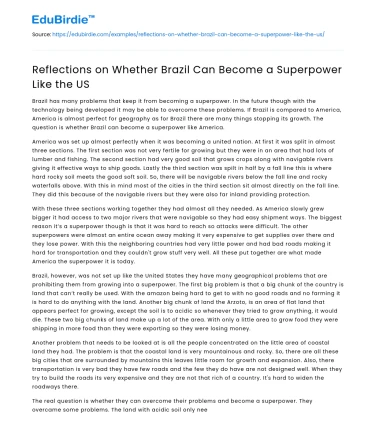Introduction
The notion of Brazil ascending to the status of a global superpower akin to the United States is a topic of considerable debate among academics and political analysts. As the largest nation in South America, both in terms of geographical size and population, Brazil wields significant influence within the region. Economically, it is considered a leading emerging market, often grouped under the BRICS alongside Russia, India, China, and South Africa. Despite these attributes, Brazil faces numerous challenges, ranging from political instability to infrastructural deficits, which could impede its path to superpower status. This essay explores Brazil's potential to achieve such a status by examining its economic capabilities, geopolitical influence, and socio-political dynamics. Addressing both the opportunities and obstacles Brazil faces, this analysis aims to provide a comprehensive understanding of the country's future on the global stage.
Economic Capabilities and Challenges
Brazil's economy is the cornerstone of its potential superpower status. As one of the world's top ten largest economies, Brazil has a diverse economic base, including agriculture, mining, manufacturing, and services. The country is a leading exporter of commodities like soybeans, coffee, and iron ore, which have been pivotal in driving economic growth. According to the World Bank, Brazil's GDP was approximately $1.8 trillion in 2022, demonstrating its economic might within the region. However, despite this impressive economic footprint, Brazil grapples with significant issues that could hinder its superpower aspirations.
Save your time!
We can take care of your essay
- Proper editing and formatting
- Free revision, title page, and bibliography
- Flexible prices and money-back guarantee
Economic inequality remains a profound challenge, with a stark divide between the wealthy and impoverished segments of the population. The Gini coefficient, a measure of income inequality, positions Brazil among the most unequal countries globally. This disparity not only affects social cohesion but also limits the country's economic potential by restricting access to education and skilled labor. Furthermore, Brazil's heavy reliance on commodity exports makes it vulnerable to global market fluctuations, as seen in the economic downturns triggered by falling commodity prices.
To overcome these challenges, Brazil needs to invest in diversifying its economy and improving infrastructure. Enhancing the education system and fostering innovation would enable the country to transition towards a knowledge-based economy, reducing dependence on natural resources. Moreover, implementing robust economic reforms to tackle corruption and improve the business climate is essential for attracting foreign investment. As former President Luiz Inácio Lula da Silva stated, "Brazil must look for its own path, making the necessary reforms and ensuring that development is sustainable and inclusive."
Geopolitical Influence and Strategic Alliances
Brazil's geopolitical influence is another critical factor in its quest for superpower status. As the largest country in Latin America, Brazil plays a pivotal role in regional affairs and often acts as a mediator in regional conflicts. It is a founding member of several regional and international organizations, including the United Nations, the Organization of American States (OAS), and the BRICS group. These memberships provide Brazil with platforms to exert influence and collaborate on global issues.
In recent years, Brazil has sought to strengthen its strategic alliances, particularly with other BRICS nations. Collaborations with China and India, in particular, have proven beneficial in terms of trade and investment. Moreover, Brazil's participation in UN peacekeeping missions underscores its commitment to global peace and security, enhancing its diplomatic stature. However, critics argue that Brazil's foreign policy lacks consistency, often oscillating between regional leadership ambitions and a non-interventionist stance.
To bolster its geopolitical influence, Brazil must adopt a more assertive and coherent foreign policy that aligns with its superpower aspirations. This entails not only deepening existing alliances but also engaging with new partners across different continents. Enhancing military capabilities and investing in defense infrastructure would further solidify Brazil's position as a regional powerhouse. As political analyst Matias Spektor notes, "Brazil must decide whether it wants to be a regional player or a global power, and act accordingly."
Sociopolitical Dynamics and Institutional Challenges
The sociopolitical landscape in Brazil presents both opportunities and challenges for its emergence as a superpower. Brazil is a vibrant democracy with a diverse and multicultural society, factors that can contribute to its soft power on the global stage. Cultural exports, such as music and sports, notably football, bolster Brazil's international image and foster goodwill.
However, political instability and institutional weaknesses pose substantial barriers. Brazil has experienced numerous political upheavals, including corruption scandals that have eroded public trust in government institutions. The impeachment of former President Dilma Rousseff and the subsequent political turmoil illustrate the fragility of Brazil's political environment. These challenges underscore the need for comprehensive political reforms to enhance governance, transparency, and accountability.
Strengthening democratic institutions and promoting political stability are crucial for Brazil to realize its superpower potential. This involves not only addressing corruption but also ensuring that the political system is inclusive and representative of the diverse Brazilian populace. Civil society and grassroots movements play an integral role in advocating for these changes. As former President Fernando Henrique Cardoso emphasized, "Brazil’s future depends on its ability to build a society that is both free and fair, with institutions that are robust and accountable."
Conclusion
In conclusion, while Brazil possesses significant attributes that could propel it toward superpower status, several formidable challenges must be addressed to realize this potential. The country's vast economic resources, regional influence, and cultural soft power provide a solid foundation. However, economic diversification, geopolitical strategy, and political reform are critical areas requiring attention. By implementing comprehensive reforms and adopting a cohesive foreign policy, Brazil can strengthen its position on the global stage. The path to superpower status is complex and multifaceted, necessitating a strategic approach that leverages Brazil's strengths while addressing its vulnerabilities. As Brazil navigates this journey, its ability to adapt and innovate will be paramount in determining its future role in the international arena.






 Stuck on your essay?
Stuck on your essay?

